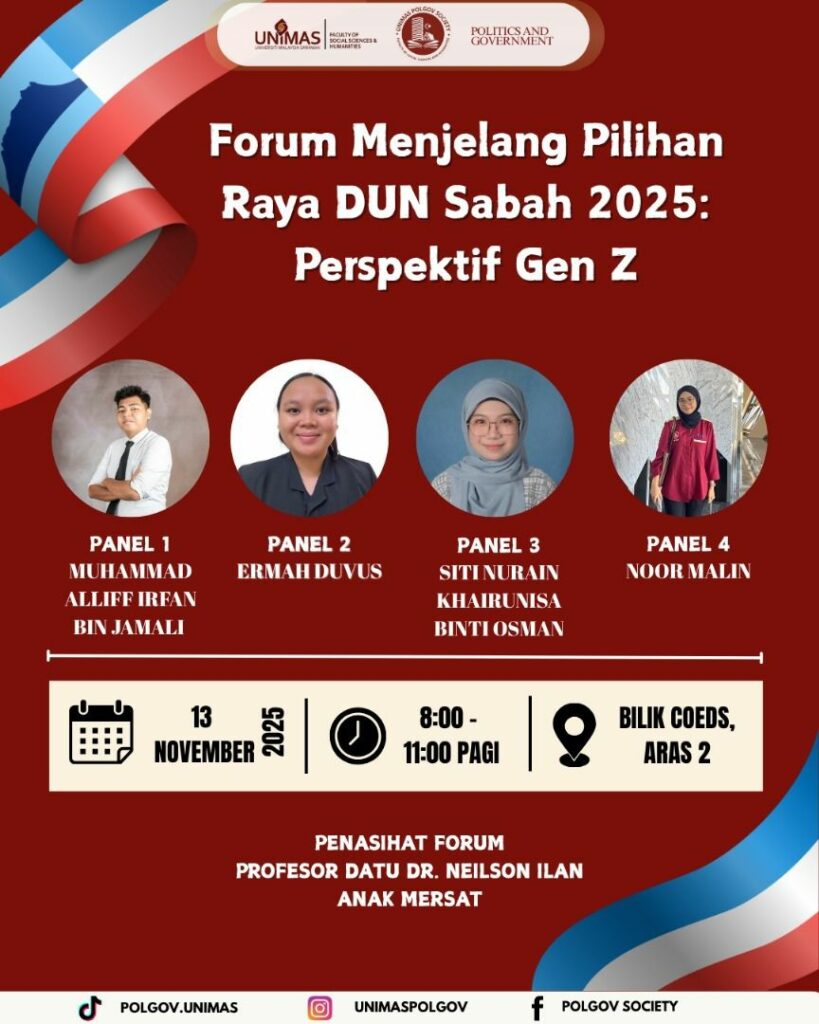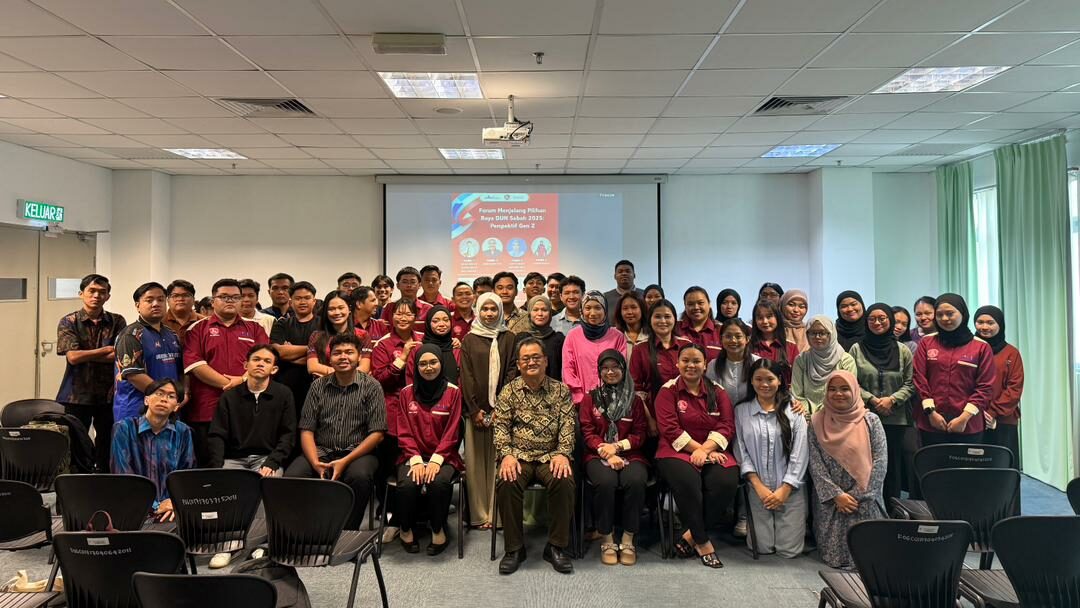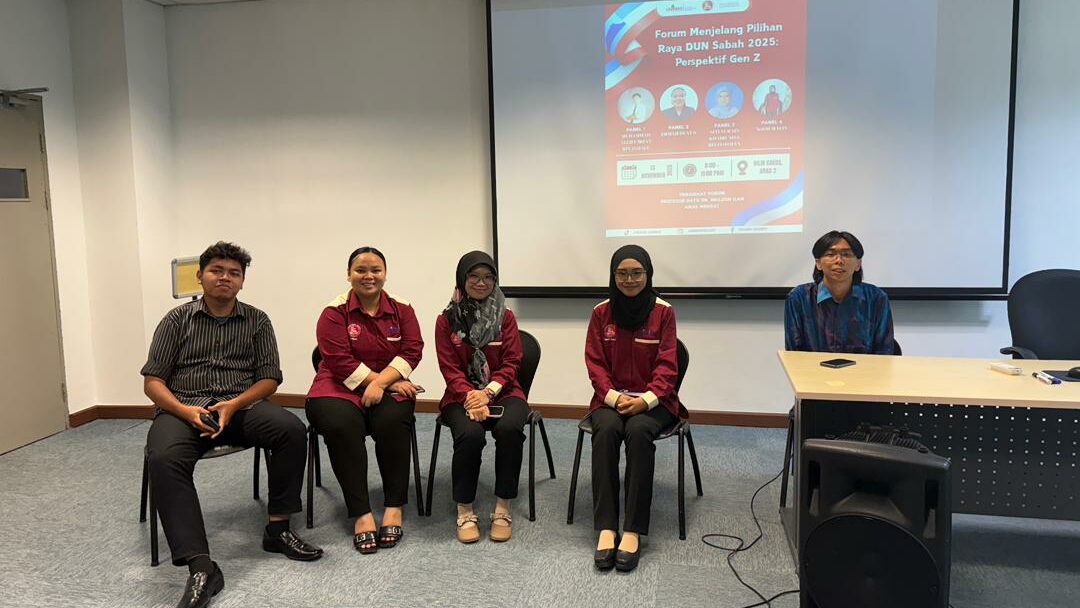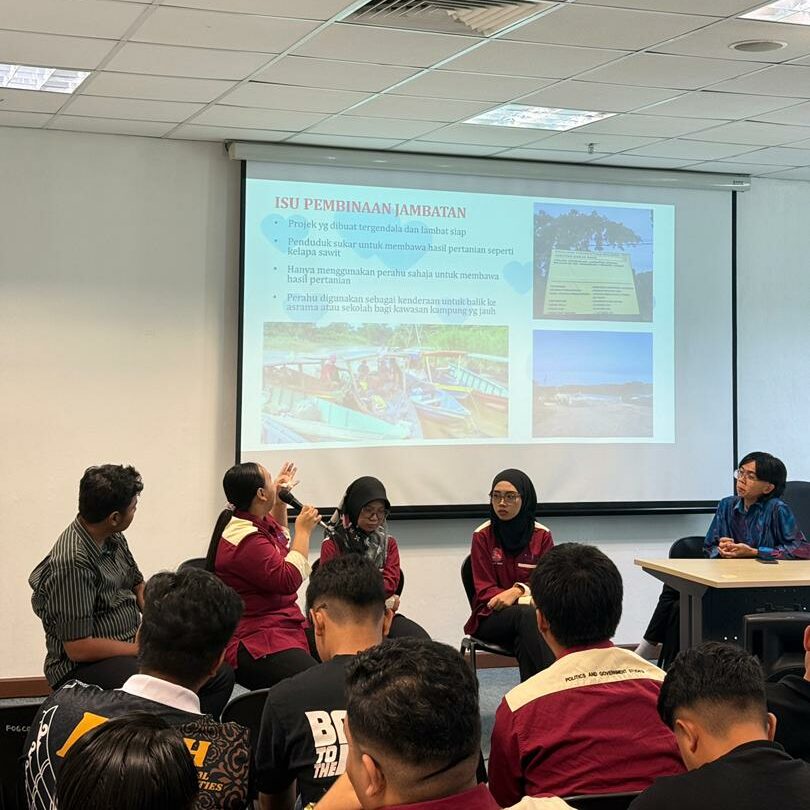Written by Gilbert Ganing Anak Peter
The political dynamics of Sabah is one of the most complex electoral landscapes in Malaysia as it can be characterized by overlapping issues of development equity throughout Sabah, native land security, rural infrastructure development, multicultural representation and federal–state relations. As the state will anticipate the Pilihan Raya DUN Sabah 2025, an intensified and dynamic climate of public concern has emerged especially among young voters who perceived politics not as a platform of personality worship but as an important tool to negotiate justice, and basic needs.
It is within this context of political consciousness among the youth that the forum titled “Menjelang Pilihan Raya DUN Sabah 2025: Perspektif Gen Z” was successfully held at COEDS Room of the Faculty of Social Sciences and Humanities, UNIMAS, on the morning of 13 November 2025. The event was organised by second-year students from the programme of Politics and Government Studies, had successfully brought garnered more than seventy attendees, reflecting an energized and active wave of civic responsibility among university students, especially among Politics and Government Studies’ students.
Its advisor, Prof Datu Dr Neilson Ilan Mersat, explained that the forum is being convened in anticipation of the 2025 Sabah state election to provide students with an opportunity to critically engage with salient political issues likely to intensify during the electoral period. It also aims to ensure that students remain well-informed about ongoing political developments in the state and the broader national context.

In addition, the forum appropriately situates itself within the framework of Malaysia MADANI as one of the guidelines in organizing this event, which emphasizes values of sustainability, care, respect and responsibility as the moral guideline of governance, and at the same time aligns with the global obligations of the Sustainable Development Goals (SDGs). Through the lens of political education in context of this forum, the programme directly fostered SDG 4 (Quality Education) by nurturing democratic literacy among the youth, SDG 10 (Reduced Inequalities) by foregrounding rural marginalization in Sabah, and SDG 16 (Peace, Justice and Strong Institutions) by promoting dialogue on accountability, transparency and electoral legitimacy holistically. Thus, it embodied a critical academic mission in transforming university spaces into an incubator of informed citizenship.

To ensure scholarly traction, the session was guided by Professor Datu Dr Neilson Ilan Mersat, who served as the Forum Advisor. His involvement in this event reinforced methodological discipline and provided the academic thrive and insights especially in terms of preparations and guidance throughout the event that are necessary to elevate the conversation to another level. The forum was featured by four panelists from Year 2 students of Politics and Government Studies, Muhammad Aliff Irfan Bin Jamali, Ermah Duvus, Siti Nurain Khairunisa Binti Osman, and Noor Malin and each was tasked with analysing Sabah’s development and governance issues at the constituency level. Their presentations were centered around the districts of Tawau, Tongod, Sook and the Kuamut belt of Sabah, that symbolize the diverse range of socio-political realities faced across the state of Sabah. Instead of narrating general political anxieties and emotional political sentiments, each panelist reconstructed an analytical landscape rooted in empirical conditions such as access to clean water, condition of roads, electricity disruption, land rights, institutional responsiveness and security concerns in Sabah.
The intellectual rationale behind the forum was anchored in the recognition that a state election is never merely a contest to determine which candidate ascends to office but rather, it is a referendum on whether political institutions have fulfilled the aspirations of ordinary citizens. This was captured eloquently in the opening intellectual orientation presented by Professor Datu Dr Neilson Ilam, who reminded the audience that elections must be evaluated through the moral lens of social justice and facts rather than mere partisan spectacle. Through this perspective, the forum framed Sabah’s upcoming election not as a competition of personalities and political logos, but as a test of the sincerity and effectiveness of development delivery.
The event also placed strategic emphasis on Gen Z as a decisive electoral bloc. Sabah contains one of the largest and fastest-growing youth voter populations in Malaysia following the implementation of Undi18, and this demographic is distinguished by its analytical, digitally mediated and expectation-driven approach to politics. The forum therefore curated youth not merely as passive observers of democratic processes, but as active stakeholders in the shaping of Sabah’s development trajectory.

The transition from opening remarks to the discussions that were district-based analysis marked the beginning of a structured yet dynamic intellectual opinions exchange among the panelists. Each panelist was entrusted with describing the challenges in their respective areas as well as figuring out their political significance in the run-up to the state election this time around. Gradually, a clear thread emerged across presentations as the electoral mood in Sabah hinges far more on the lived realities of public welfare than on ideological rhetoric politically based on the point being given by the panelists.
The beginning part of the forum, therefore, effectively reframed the Sabah election in terms of development justice which is a concept where the legitimacy of governance cannot be separated from its responsibility to ensure that no district, regardless of geographical aspects, ethnicity or economic potential, is treated as peripheral or disposable. Through this lens, the forum succeeded in constructing an academically grounded, ethically charged and youth-driven discourse that set the tone for a deeper unpacking of Sabah’s constituency-specific issues.
As the forum progressed into its core contents, the discussion progressed into a rich and multidimensional assessment of development challenges shaping the lived truths of Sabahans. The discussion did not revolve around personalities or political slogans, but rather the structural fundamentals of citizenship such as land security, access to clean water, transportation networks, digital connectivity, education, public safety and environmental protection.
Among the issues highlighted was the enduring strain over tanah adat, with communities in districts. Districts such as Sook continue to defend ancestral land against corporate interference. The lack of formal documentation has created a condition where native land, spiritually and economically integral, becomes vulnerable to appropriation by plantation companies and logging interests. In communities where land symbolises identity, lineage and survival, dispossession carries implications far beyond economics; it signals an erosion of belonging and an institutional failure to safeguard indigenous dignity. This deep historical grievance is expected to remain a defining undercurrent of Sabah’s political conversation, particularly as the state election approaches.
Access to fundamental infrastructure remains a critical challenge across Sabah, revealing deep inequalities in development. Many rural settlements continue to rely on rainwater or untreated river sources due to inadequate piped systems, while electricity supply is unreliable, disrupting households, schools, and local economies. Poor road conditions exacerbate these difficulties, with eroded, unlit highways and seasonal inaccessibility forcing communities to rely on river transport for education, healthcare, and agricultural trade. These interlinked deficiencies such as water, electricity, and mobility, demonstrate that access to basic services is still unevenly distributed, turning essential needs into sources of daily struggle.
Digital exclusion compounds these infrastructural gaps, isolating communities from education, government services, and economic opportunities. Weak internet connectivity in districts such as Tongod illustrates how technological access has become a new frontier of inequality, further limiting participation in civic and economic life. Similarly, inadequate emergency response facilities, including distant fire stations, underscore how public safety is tied to geography, leaving residents to fend for themselves in critical situations. Environmental governance also intersects with these challenges: illegal mining in Tawau polluted water sources despite regulatory measures, eroding public trust and demonstrating how corporate practices can intensify vulnerabilities in already underserved areas.
Together, these issues shape the political consciousness and electoral behaviour of Sabahans. Access to infrastructure, environmental protection, and connectivity is no longer peripherality has become a measure of governance itself. As forum discussions highlighted, the 2025 state election is increasingly seen not merely as a contest of parties or leaders, but as a referendum on development justice. Communities are evaluating political authority based on their ability to translate promises into equitable access to basic services, turning lived experiences of hardship and fulfillment into a decisive political language.


Based on these insights, several recommendations can be made for Sabah. Civic education programs should be expanded to enhance political literacy, critical thinking, and participatory engagement among youth. Governance institutions and political actors must prioritize ethical, transparent, and inclusive decision-making to build trust and respond effectively to the expectations of young voters. Digital platforms should be leveraged to facilitate dialogue, disseminate accurate information, and provide space for constructive feedback. Policymaking should emphasize issue-based strategies that address education, youth empowerment, social equity, and sustainable development. Finally, cross-sector collaboration between universities, civil society, and government agencies should be encouraged to provide students with richer experiential learning and broader opportunities for civic engagement.
At the national level, Malaysia can also benefit from these lessons. Embedding SDG and MADANI principles in national policy ensures that development is sustainable, inclusive, and ethically grounded. Investment in youth leadership and civic education programs will cultivate a politically informed population capable of contributing meaningfully to democratic processes. Participatory governance mechanisms, such as consultation platforms and co-creation initiatives, should be strengthened to improve policy relevance and public accountability. Evidence-based policymaking, guided by research and impact assessments, will further ensure that policies address societal needs effectively. Additionally, national dialogue on digital democracy is essential to balance freedom of expression with responsible engagement, fostering cohesion and ethical political participation.
In conclusion, the POLGOV Society’s experiences highlight the critical role of youth in shaping Sabah and Malaysia’s political landscape. By synthesizing lessons from student initiatives, SDG-aligned programs, and MADANI principles, it becomes clear that ethical leadership, civic engagement, and participatory governance are indispensable for sustainable development. Implementing the recommendations outlined above will enable both Sabah and Malaysia to cultivate inclusive, accountable, and forward-looking governance structures, ensuring that the aspirations of younger generations are meaningfully incorporated into the democratic and developmental processes of the nation.
FSSH – A Partner for Social Change